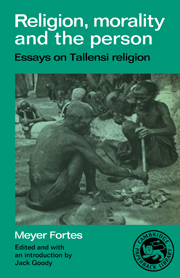Book contents
- Frontmatter
- Contents
- List of figures
- Introduction by Jack Goody
- 1 Divination: religious premisses and logical techniques
- 2 Prayer
- 3 Ritual festivals and the ancestors
- 4 Ancestor worship in Africa
- 5 Ritual and office
- 6 Totem and taboo
- 7 Coping with destiny
- 8 Custom and conscience
- 9 The first born
- 10 The concept of the person
- Endpiece: sacrifice among theologians and anthropologists
- Notes
- References
- Index
3 - Ritual festivals and the ancestors
Published online by Cambridge University Press: 13 October 2009
- Frontmatter
- Contents
- List of figures
- Introduction by Jack Goody
- 1 Divination: religious premisses and logical techniques
- 2 Prayer
- 3 Ritual festivals and the ancestors
- 4 Ancestor worship in Africa
- 5 Ritual and office
- 6 Totem and taboo
- 7 Coping with destiny
- 8 Custom and conscience
- 9 The first born
- 10 The concept of the person
- Endpiece: sacrifice among theologians and anthropologists
- Notes
- References
- Index
Summary
A festival, the Oxford English Dictionary tells us, is ‘a time of festive celebrations’. I am sure there is not now and never has been a human community which has utterly eschewed such celebrations. And nowhere, perhaps, are festivals so frequent and of such extremely varied types and complexions – whether movable or immovable – as in this country.
A recent guide book (Cooper 1961) enumerates over one hundred regularly recurring British festivals beginning with Crufts Dog Show in February and including all our musical and theatrical festivals, annual art exhibitions, test matches, and of course the boat race, and ending with a long list of what are called traditional festivals such as the State Opening of Parliament and Guy Fawkes Day. It is of interest that all of these so enumerated are secular celebrations. There is no reference for example to either Christmas or Easter, let alone the numerous Saints' days that are still listed in our University Diaries. But in contrast, Italy is credited with a veritable plethora of religious festivals. There is one or more of such festivals in every month of the year and both Easter and Christmas are among those listed and described. Harvest Festivals are not unknown in this country but are ignored in the guide book I have quoted. In Italy they are especially noted as times ‘when there is singing of religious songs and it is considered blasphemous to sing love or humorous songs’ – a prohibition of certain kinds of frivolity that would be appreciated in parts of Africa known to me.
- Type
- Chapter
- Information
- Religion, Morality and the PersonEssays on Tallensi Religion, pp. 37 - 65Publisher: Cambridge University PressPrint publication year: 1987
- 1
- Cited by



